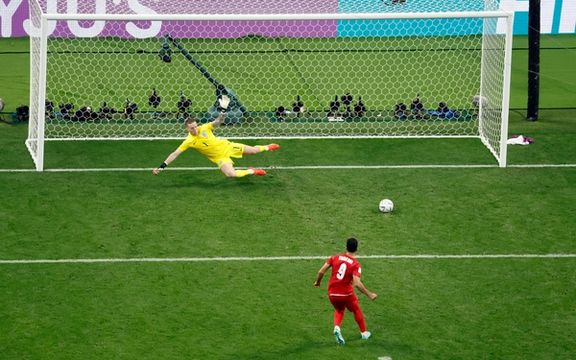Iranian President Finally Accepts Resignation Of Roads Minster
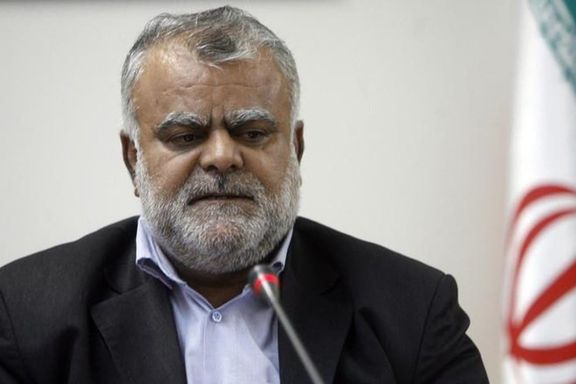
Following days of unconfirmed reports, President Ebrahim Raisi finally accepted the resignation of Iran’s Minister of Roads and Urban Development Rostam Qasemi.

Following days of unconfirmed reports, President Ebrahim Raisi finally accepted the resignation of Iran’s Minister of Roads and Urban Development Rostam Qasemi.
Iranian media say he has resigned due to his deteriorating health condition. Although no further details have been provided, reports say Qasemi (Ghasemi) is suffering from cancer and is under treatment.
After Qasemi’s resignation, who was a Revolutionary Guard high-ranking officer, Shahriar Afandizadeh, a deputy of at the ministry was introduced as the caretaker.
IRNA news agency quoted Raisi's parliamentary deputy Mohammad Hosseini as saying that the proposed pick to replace Rostam Ghassemi will be introduced to the parliament on Sunday.
Qasemi's resignation comes after some leaked images showed the Iranian Revolutionary Guard commander holidaying with his unveiled girlfriend in Malaysia.
The photos led to massive outrage as security forces continue to crack down on anti-hijab protests following the death of Mahsa Amini in ‘hijab police’ custody.
Farhikhtegan daily had earlier demanded his dismissal for not fulfilling his promises, saying "the impeachment or correction of the performance of the Minister of Roads and Urban Development will be a glimpse of hope for people.”
During his campaign for president, Raisi had promised to build one million houses a year; something that Rostam Qasemi could not achieve during his first year in office.
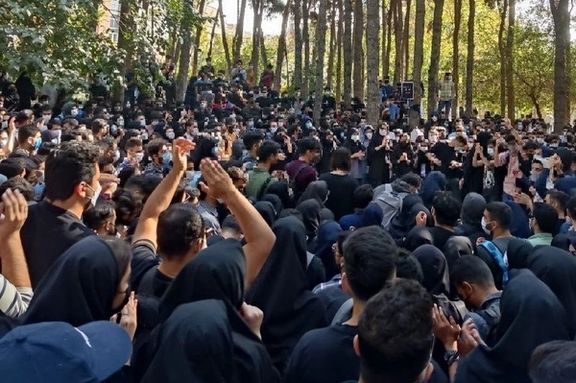
As student continue to hold antigovernment rallies in Iranian universities, lawmakers have presented a proposal to ban them from traveling abroad for ten years.
Shargh daily reported Tuesday that banning the protesting students from leaving the country for a long period is only one of the punishments considered by the parliamentarians.
According to this report, "experts" have also participated in the preparation of the draft law, without identifying them, however, they are probably agents of intelligence and security organizations.
The draft legislation was prepared under the title of dealing with "norm-breaking" students, and it is stated that "cursing and insulting sanctities" is one of the actions that the government will consider as "norm-breaking".
The comes a few days after Supreme Leader Ali Khamenei spoke about the "vulgarity" of the demonstrators' rhetoric.
Earlier, some senior commanders of the IRGC also deemed “shameless” words used in slogans chanted by some students at the universities.
According to Shargh daily, several members of parliament have signed the draft law, trying to collect more signatures to put it on the agenda of the parliament.
The Islamic Republic routinely bans critics from the right to travel abroad.
Earlier, the lawmakers’ attempts to call for death penalty for demonstrators provoked anger among people. However, the signatories were afraid to reveal their identity.
Iran’s universities and schools have been the scene of routine daily protests after the killing of Mahsa Amini by police in mid-September.
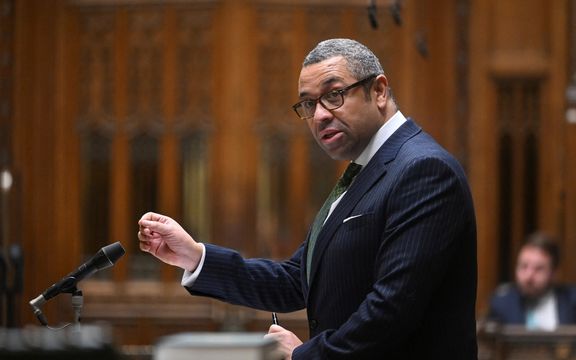
Britain’s foreign minister has said sending armed police to Iran International London offices was “a message to people …that they will be protected in the UK.”
In an interview published Tuesday in the Saudi-owned Asharq al-Awsat newspaper, James Cleverly described the sending of armed response units over the weekend as “action to protect people in the UK from what we are perceiving to be threats from Iran because it is incredibly important that people feel able to speak openly and honestly about what is going on in Iran.”
Speaking during an interview Sunday on the sidelines of the Manama conference of the International Institute for Strategic Studies, Cleverly said the move showed the British government took “the importance of free, honest and open journalism incredibly seriously.” The Islamic republic has accused foreign-based Persian media outlets, including Iran International and the BBC Persian of fomenting violence and its Judiciary has called for designating them as “terrorist entities.”
‘In Iran’s hands’
Quizzed over the current state of paused talks over reviving Iran’s 2015 nuclear agreement with world powers, the JCPOA (Joint Comprehensive Plan of Action), Cleverly said it was “in Iran’s hands” to engage successfully.
“The ball is very much in Iran’s court and has been for a while now,” Cleverly said. “The message I may send to the Iranian leadership is that it is in their hands to take action which would engage better with this process. We put a deal forward, it is a very good deal and the Iranians should engage with that.”
The United Kingdom – alongside France, Germany and the United States – has argued that a series of proposals drawn up by European Union officials earlier this year offer the basis for agreement on how to revive the JCPOA, which the US abandoned in 2018 while imposing draconian sanctions. Tehran has argued it needs ‘guarantees’ to cushion it against any future US withdrawal from the agreement.
Cleverly appeared to concede that the challenge of reaching agreement on JCPOA renewal had been complicated by protests in Iran since mid-September – in which 410 protestors and 54 members of the security forces have died according to one recent toll – and by Tehran’s supply of military drones to Russia.
He defended the UK’s approach of responding to Iran by levying more sanctions, including against the ‘morality police’ and on “companies and individuals responsible for those drone exports to Russia.”
Targeting individuals and entities
Cleverly argued that such sanctions could be effective in changing Iranian behavior: “We want the Iranian leadership to listen to the Iranian people and we will make sure that when members of the Iranian leadership do things which are unacceptable, we target those individuals and those entities very timely with our sanctions to deter them.”
The foreign minister also expressed British resolve over Iran “attempting to destabilize” neighboring states. “For example, British warships have intercepted the missile systems or engines for missile systems coming from Iran and will continue to take action both to prevent that destabilizing activity in the region and also very specifically target with sanctions those individuals who are responsible for that behavior.”
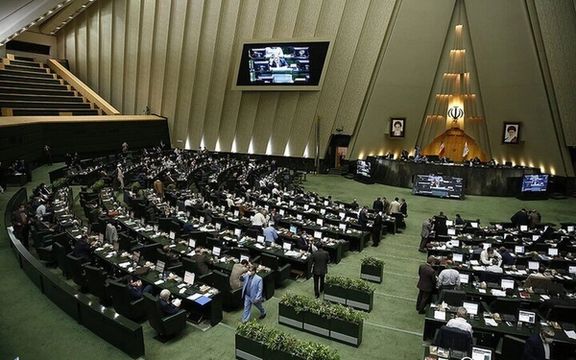
Differences are emerging in Iran’s parliament over how to justify the bloody crackdown on protesters, particularly the recent bloodshed in Kurdish regions, with hardliners hindering investigation.
According to an article in reformist daily Etemad Online on Tuesday, Tabriz representative Ahmad AlirezaBeigi – himself a conservative politician and a retired police officer – said that despite demands to hold special sessions in parliamentary committees to discuss the protests, some representatives create obstacles to prevent any probe into the high number of people killed.
He said constituents have been demanding special meetings either at the Internal Affairs or the National Security committees. He also dais the interior ministry should be held accountable.
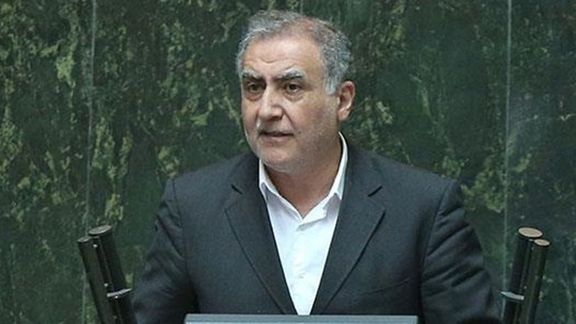
He claimed that the attempts have been stifled mainly by the members of the Front of Islamic Revolution Stability (Paydari), a so-called “principlist” political party sometimes described as the "extreme end of the fundamentalist camp" and "Iran’s most right-wing party."
Alireza Beigi added that how authorities react to the current developments is very important in shaping the unfolding events. He mentioned the bloody crackdown on protesters in Sistan-Baluchestan province as an example, saying that people sought accountability over the rape of a young girl in the city of Chabahar by a police officer and shooting nearly 100 people in the provincial capital Zahedan on September 30, that became known as the Bloody Friday of Zahedan. But when a representative from the province talked about the incidents in parliament, his microphone was turned off as hardliners reacted harshly. As a result, the protests escalated, and the Sunni leader of the Baluch people Molavi Abdolhamid criticized Supreme Leader Ali Khamenei’s rule. Then Khamenei’s sent an envoy to the region and suddenly all those who were killed as “rioters” were labeled “martyrs.”
Reports about the alleged rape of a 15-year-old Baluch girl in June by a police commander in Chabahar, who has remained immune to prosecution, sparked protests in Zahedan on September 30.
In the past few days, the Islamic Republic has intensified its repression on Kurdish-majority cities and towns in western provinces following reports that parts of some small towns had fallen into the people’s hands. The majority of Iran's 10 million Kurds live in the western parts of the country. It has also launched repeated attacks against Iranian Kurds sheltering in Iraqi Kurdistan. The Islamic Republic’s military crackdown on Kurdish regions can be construed as a new episode of escalating the unrest beyond Iran’s borders.
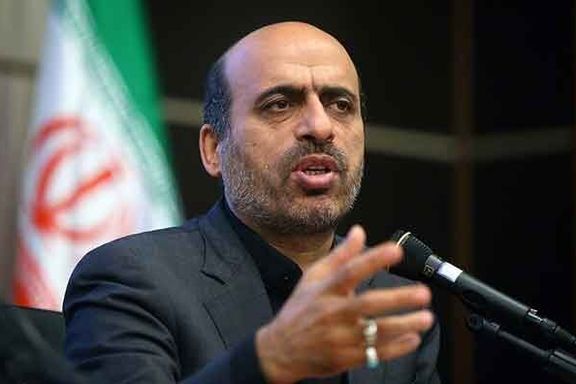
To check the veracity of the claims by Alirezabeigi, the newspaper contacted member of the Internal Affairs committee Mohammad Hossein Asafari -- a former senior commander of the Revolutionary Guard, IRGC, who said the issue is not within the jurisdiction of the parliament's National Security committee. He added that the recent incidents in Kurdish regions are not the result of the demands by the people, and those who are on streets to protests “are the terrorists and must be dealt with decisively."
There are increasing indications that Iran's so-called neo-cons are attacking the ultraconservative Paydari Party to end its dominance in the administration of President Ebrahim Raisi. The neo-cons led by Majles (parliament) Speaker Mohammad Bagher Ghalibaf have been trying to convince others in Iran’s political circles that they are prepared to establish "new governance," and bring about "reforms in the system" based on "new plans." These are the buzzwords heralding change from within the system at a time when young men and women in the streets do not seem to be listening to anyone representing the regime.

Gabriel Noronha and Morgan Viña of JINSA in this op-ed article urge the United Nations to act against Russian and Iranian violations of international rules.
This year capped off a disastrous run for the United Nations Security Council and its mandate for the “maintenance of international peace and security”. The world saw Russia – a permanent member the Council – blatantly violate the UN Charter through its illegal invasion of Ukraine and purported annexation of Ukrainian territory. Now, along with Iran, Russia is deliberately violating the edicts of the UN Security Council Resolution (UNSCR) 2231, which, among other restrictions, prohibits transfers of weapons and ballistic missiles to and from Iran. The other UN Security Council members must act quickly and decisively to preserve the crumbling credibility of the institution and its resolutions.
Iran has been supercharging Russia’s war efforts by sending hundreds of attack and suicide drones used to hit Ukrainian civilians, military vehicles, and energy infrastructure. The Ukrainian government quietly disclosed that Iranian military trainers were present in Ukrainian territory occupied by Russia. Now, according to reports from US and foreign intelligence services, the Iranian regime is set to deliver surface-to-surface Fateh-110 and Zolfaghar ballistic missiles with ranges up to 700 kilometers. These missiles would help refill Russia’s depleted war machine to kill even more innocent Ukrainian civilians.

The international community must recognize that Iran is now a belligerent in Russia’s war against Ukraine and should be treated diplomatically as a co-combatant with Russia. For starters, European nations could quickly cancel the dozens of incoming flights to their airports from sanctioned Iranian airlines that simultaneously are delivering drones and missiles to Moscow. But the United States and like-minded nations on the Security Council must also respond to Iran and Russia’s blatant violations of UNSCR 2231. A refresher on the resolution:
When the Iran Deal was finalized in 2015, it contained two parts: the Joint Comprehensive Plan of Action (JCPOA), a non-binding political agreement that described various commitments by United States, the European Union, and Iran; and UNSCR 2231 – a legally-binding resolution passed by the UN Security Council that combined and modified the previous six UN Security Council resolutions against Iran. The new, unified resolution enacted strong and permanent restrictions and sanctions against a wide range of Iranian behavior, including an arms and ballistic missile embargo as well as broad sanctions against its nuclear program. The new 2015 resolution kept several of those restrictions, but Iran was rewarded with time-limitations on each sanction – divorced from any assessments of its ongoing behavior or adherence to the UN’s restriction.
In a farcical turn of events, on October 18, 2023 – now less than a year away – Iran will become free from any UN sanctions that prohibit the sale, purchase, or transfer of ballistic missiles or drones – legalizing the destabilizing weapons transfers it is currently sending Russia.
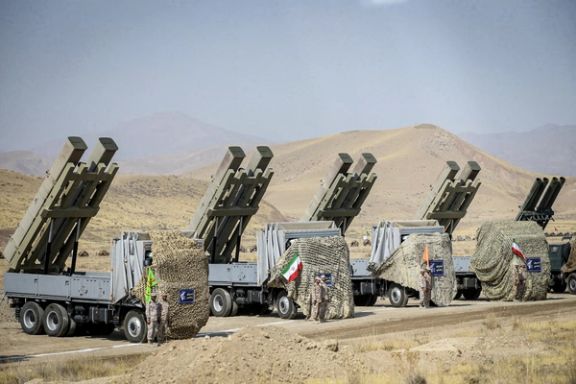
It gets worse. On October 18, 2025, the resolution will self-destruct, ending all UN sanctions on Iran entirely – permitting Iran to legally enrich and reprocess uranium and giving the regime legal cover to advance its nuclear program dangerously close to an enrichment breakout capacity. These pending sunsets are proverbial and literal ticking time bombs.
If the Security Council continues to ignore these weapons transfers in blatant violation of UNSCR 2231, it will reinforce the message that Security Council resolutions are mere paper tigers. Those who believe in the merit of multilateral institutions should be worried too: this puts another dagger in the argument that the peace and stability can be obtained through the United Nations and its pronouncements.
The other members of the UN Security Council must take firm action in response to these violations. First, they should take advantage of the “snapback” procedure in UNSCR 2231 that would permanently return all the UN sanctions set to expire over the coming few years. This would have several practical impacts: it would return the UN’s conventional weapons ban and travel restrictions against Iran’s top terrorists that both expired in October 2020. It would stop the pending expiration next year of the ballistic missile restrictions and the nuclear sunsets in 2025.

Snapback can be initiated by any of the “participants” as defined in UNSCR 2231, which includes the United States, (even while it had ceased participation in the separate JCPOA, it was still listed as a UNSCR 2231 participant), France, Germany, the United Kingdom, European Union, Russia, China, and Iran. The snapback is a 60-day process triggered by a submission by any of these parties that other participants were not meeting their requirements in the JCPOA. Iran started publicly violating its nuclear commitments starting in May 2019 and abrogated them entirely in January 2020.
There is a clear precedent for snapback. In 2020, without the support of other Security Council members, the Trump Administration initiated the snapback mechanism, noting President Barack Obama’s pronouncement in 2015 that, “We won’t need the support of other members of the UN Security Council, America can trigger snap back on our own.”
While it may have passed legal muster in the eyes of the US government, the reality is that other nations ignored the move entirely and refused to recognize the validity of the snapback, citing that the United States had ceased participation in the JCPOA. Paris, London, and Berlin even had the temerity to criticize US efforts to curtail Iranian weapons proliferation around the world. But ultimately the power of the snapback – as of any other UN resolution – is the degree to which other nations view the legitimacy of such acts and adhere to UN pronouncements. Unfortunately, the unilateral nature of the 2020 snapback rendered it ineffective and counterproductive.
As a result of Europe’s refusal to act in the UN, Iran has been emboldened to the point it sends weapons to attack Ukraine. Iran believes they will get away with it, and they may well be right. European credibility and deterrence have been decimated – every subsequent pledge they “will not tolerate” Iranian malfeasance only grows more sadly laughable. If Europe ever wishes to be taken seriously again on the Iran file, they must act now. Paris, London, and Berlin can rectify their errors – and show their support for Ukraine - by initiating the snapback procedure at the UN immediately.
More serious and far more difficult is the prospect of removing Russia from the Security Council altogether. This can only be accomplished by amending the UN Charter, a process that requires both a two-thirds majority vote of the General Assembly and unanimous approval by the UN Security Council – where Russia is already a member. Since Russia would not agree to its own expulsion, this typically ends that conversation, though creative legal solutions have been proposed to bypass their veto.
To its credit, the international community has taken steps, though modest, to isolate Russia diplomatically. Last March, the UN Human Rights Council, led by the United States, expelled Russia, and earlier this month, Russia failed to win re-election to the International Civil Aviation Organization’s national governing council. The international community should build off this momentum and accelerate Russia’s isolation. For example, the Food and Agriculture Organization should immediately take steps to remove Russia from its membership. Russia’s chokehold on Ukrainian ports blocked grain shipments to some of the world’s most food insecure countries. Other organizations Russia should be expelled from include the World Health Organization, for Russia’s targeted attacks on Ukrainian healthcare facilities and the World Trade Organization, of which Russia has already lost its “most favored nation” status. Iran, meanwhile, should be immediately removed from the UN Commission on the Status of Women for reasons that have been made manifestly clear in the past month of nationwide protests against the regime’s violent abuse of women.
UN Secretary-General António Guterres, who was painfully silent in his criticism of Putin for months, has finally condemned Russia’s war on Ukraine. He should follow this up with action. This should include the removal of all Russian personnel from UN peacekeeping missions and the non-renewal of UN aviation procurement contracts. The international community should be prepared to backfill these gaps to ensure mission readiness doesn’t suffer as a result.
International institutions are only as effective as their members. The Russian and Iranian regimes are intent on undermining every value the United Nations was created to promote. If the United States and Europe will not act now, there may not be much at the UN left to save.
Opinions expressed by the authors do not necessarily reflect the views of Iran International
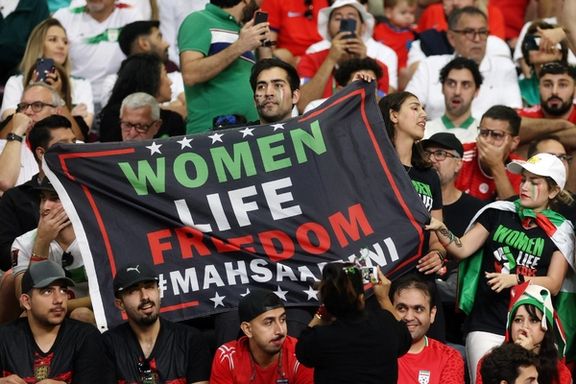
Despite Iranian footballers’ refusing to sing Islamic Republic’s anthem in support of the protests, they did not manage to save face as their humiliating 6-2 defeat prompted Iranians to celebrate the loss of their own team.
Players of Iran's national football (soccer) team who were heavily criticized by people on social media for their lack of solidarity with the nationwide protests, remained silent when the national anthem was played at the Qatar’s Khalifa International Stadium at the beginning of their match against England on Monday. The Islamic Republic state broadcaster censored the footage of the players lining up before the match as the anthem was played.
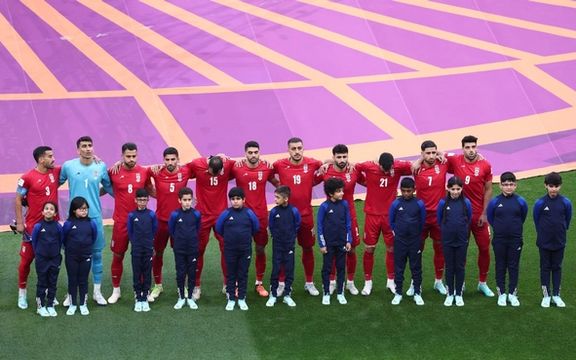
Iranian fans at the stadium shouted while the music was being played with some making thumbs-down gestures in an apparent act of protest against the Islamic Republic.
During the game, Iranian fans shouted the name of outspoken former footballer Ali Karimi, who has been charged in absentia for supporting ongoing antigovernment protests. Iranians back home, who usually celebrate in streets after Team Melli matches, came out after the game for more antigovernment protests. However, considering the Internet shut down by the government, footage from the streets is slow to appear online.

The popularity of the squad has declined in recent months, with many people accusing them of siding with the violent crackdown on protesters, who are seeking the fall of the Islamic Republic. Many people on social media say Iranians are the only nation who are vouching for the opposing team.
On Sunday, captain Ehsan Hajsafi became the first member of the Iranian team to speak out from the World Cup on the situation at home, saying "we are with them. And we support them. And we sympathize with them."
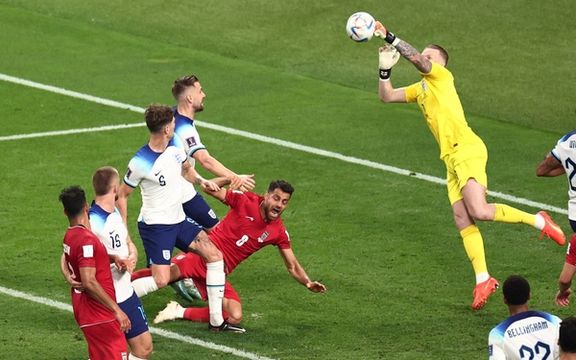
Iranians expected the players to use the World Cup as a platform to show solidarity with the protesters.
England pummeled the Iranian squad with six goals while Mehdi Taremi’s two goals – one from close range and one from the penalty spot – were the only consolation for the Islamic Republic’s representatives.
The match was the worst loss Team Melli suffered in recent history, with many Twitter users saying that if the players had not entered the pitch in support of their fellow Iranians who are being killed by government forces, they would reclaim their lost popularity and would only count as 3-nil loss for the forfeit.
